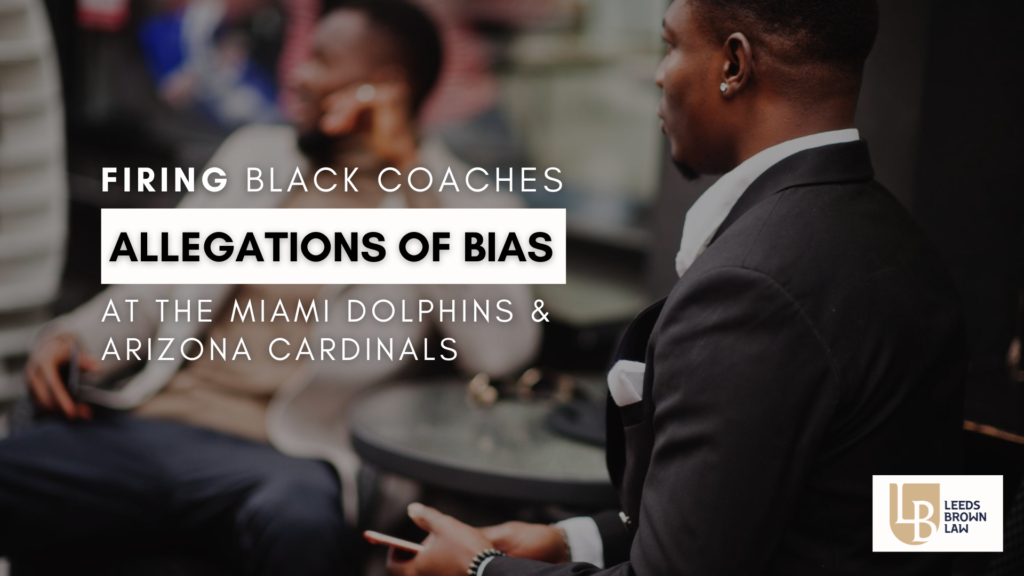The Flores Case against NFL Teams
The most recent lawsuit to rock the world of professional sports was filed by the head coach of the NFL’s Miami Dolphins, Brian Flores, with the help of discrimination harassment lawyers. The Dolphins let him go in early 2022 after he led the team in three NFL seasons, including the 2020 season in which the Dolphins had a record of 10 wins, 6 losses.Â
The claims by Flores were styled as a class-action lawsuit against the NFL, the Dolphins, and the Denver Broncos and New York Giants. Although he never led or even coached the Broncos or Giants, Flores alleged that they did not extend fair and honest interviews to Black coaches, even though the NFL as a whole had made equal opportunity a priority.
In June 2022, the press reported that Steve Wilks, the head coach of the Arizona Cardinals NFL team until he was let go in December 2018, was joining the Flores suit. Wilks had been replaced with a coach with little NFL experience, it was reported.
The week of February 14, 2024, the 49ers, where Wilks had become the defensive coordinator, announced that they were letting Wilks go. On social media, some users noticed that Wilks had led the 49ers defense to the third rank in the NFL in 2023. At the Super Bowl, the 49ers held the Kansas City Chiefs to a surprisingly low number of points and yards. The defensive team of the 49ers had a high rate of tackles and frustrated the running backs of the Chiefs. On the other hand, the offensive line of the 49ers was seen as performing poorly in the big game, leading to a weak running game and a failed final drive that fizzled out with a field goal. The special teams also missed a punt return and a critical extra point kick.
The Flores and Wilks suit remains pending. The amended complaint alleges that there is statistical evidence of racial inequality in coaching staffing in NFL teams. It quotes the NFL suggesting there is a “double standard.†The complaint does not include the 49ers firing of Wilks, which happened after the amended complaint was filed.
In 2023, the Flores-NFL battle was waged on the procedural plane. Flores sought, on his own behalf and on behalf of other Black coaches like Wilks, a jury trial on his allegations of discrimination and inadequate interviews. The NFL argued that coaches like Flores were obligated to go to arbitration against their teams without a jury or many of the trappings of a federal court case, like publicity. This would include Mr. Wilks’ claims involving the Arizona Cardinals. The court stated that coaches’ claims against their own teams had to be arbitrated, but that Mr. Flores could proceed in court (and potentially a jury) against the New York Giants, for example, and on related class claims. Neither set of parties was very happy with this, and both sets of them asked the court to overrule its own ruling in part, but it refused to do so at the time.
Proving Discrimination: Lessons in Workplace Discrimination Law
The Supreme Court has concluded that an employer sometimes has the burden of proving that an employee warranted termination or some other negative action by his or her performance, conduct, or lack of qualifications. Discriminatory treatment and apparently neutral policies that fall more heavily on specific groups may be illegal under Title VII of the Civil Rights Act of 1964, section 1981 or 1983, and/or the guidance of the Equal Employment Opportunity Commission, state statutes, and state human rights department guidance. Sections 703 and 704 of the Civil Rights Act of 1964 are particularly important. In construing them, the Supreme Court has stated that an apparently qualified member of a protected group (like a Black person or a woman, among others) who is rejected for an open position (or fired when someone of a different identity is kept on or promoted) may shift the burden to the employer to show the nondiscriminatory reason that justified the firing or failure to hire (or promote), even though the employee has the ultimate burden in a discrimination case. If the employer proves a “legitimate nondiscriminatory reason†for the termination or failure to hire, promote, or grant a beneficial transfer, the case does not necessarily end there: it may enter a more complex phase. As in many areas of employment law, the facts are important and can be developed in investigations, discovery, depositions, and demands for documents.
Next Steps
As the best lawyer for discrimination at work, Leeds Brown Law P.C. is experienced in employment class actions. In cases involving racial and ethnic minorities in the financial sector, the firm has obtained settlements benefiting various classes of employees. In age discrimination case involving a class of older workers at an insurance company, it won praise for its professionalism during the federal court proceedings. In another case involving the grocery chain Aldi, it worked with other law firms to obtain a judge’s approval of $9.8 million settlement on behalf of store managers across the nation.Â
Workers who have been discriminated against, suffered a hostile or abusive environment at work, or have been denied a job or a promotion may particularly benefit from pursuing litigation with the aid of an experienced discrimination harassment lawyer. It is therefore important to know your rights when it comes to harassment, discrimination, and equal opportunity employers. A free consultation can help you understand your rights and take action to protect them, including by contacting human resources or the government.

